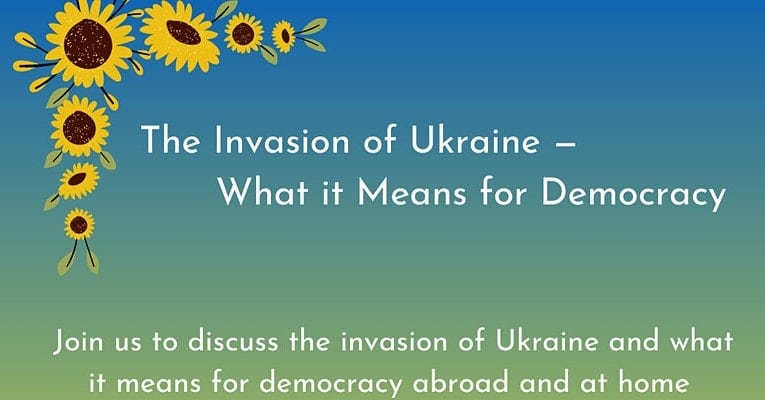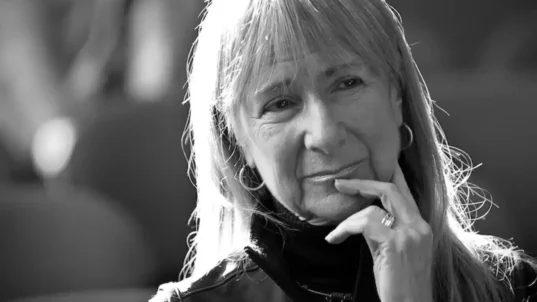
In our third and final conversion exploring the Invasion of Ukraine & What it Means for Democracy, participants looked forward and explored different ideas of what an end to this war might entail, what some form of peace might look like, how we might get there, and what it might mean for Ukraine, Russia, and for the rest of the world.
From these discussions, here’s a summary of some of the different versions of how this war might end, what peace might look like, and the broader implications.
What are our hopes for ending this war? That the violence ends, that some sense and form of peace is restored, and that—
- The Ukrainian people and their nation survive within their pre-invasion boundaries, and the country’s physical infrastructure is rebuilt
- There is healing of the physical and psychological trauma of this war
- The refugees are well taken care of, treated with respect and dignity, and eventually able to return home or be re-settled
- There is some change for the better in Russian governance
- The war is a catalyst for a new, greater, and enduring sense of solidarity, international cooperation, and mutual support among all nations
What are some of our fears for the future? What do we worry might happen despite our hopes?
- The war doesn’t end; there is no peace but rather the war—
- Accelerates and spreads to other countries, becomes WW III
- Putin uses nuclear, biologic, or other weapons of mass destruction
- Continues as a “slow burn,” regional conflict
- Leads to the complete annihilation of the Ukrainian nation, and the rest of the world is unable or unwilling to stop it
- Putin “wins,” or faces no real accountability, reinforcing and normalizing the use of authoritarian methods, and thus increasing their use worldwide
- Human rights, civil liberties, self-determination, self-governance and other democratic practices and norms decline throughout the world
- The genocide inflicted on the Ukrainian people and the disruption to the rest of the world are not stopped, not addressed, which leads to further and ongoing casualties, conflicts, and disruptions
More positively and looking forward to some longer-term peace, what are some of the key themes or issues that might be included or considered—both to help get us there and to better sustain that peace?
- A re-conceived framework for international relations, security agreements, trade, and multilateral alliances that—
- Supports and sustains international standards and practices for diplomacy, stability, self-determination, self-governance, human rights, international cooperation, common aid and defense
- Incorporates, in some way, non-democratic nations, while also recognizing that there must be clear responses to aggressions against other countries, and that such aggressions must be deterred and the aggressors not rewarded for their violations of international order
- Provides a new and effective framework for monitoring, reducing, and eventually eliminating nuclear weapons and other weapons of mass destruction
- Provides for cooperation, information sharing, and transparency on international trade, banking, and other financial transactions
- More effectively addresses climate change and provides for cooperation on the development of alternatives to fossil fuels and energy transmission
- Includes substantive and enforceable agreements, including cost-sharing, on the treatment and care for refugees, of all nations, races, and ethnicities
- A different, longer-term path forward for Russia and its governance that provides a framework for understanding and addressing the questions of what comes after Putin, and under what conditions might Russia eventually rejoin the community of nations
- Getting there, in the near term at least, could include—
- Concessions to limit NATO membership in Eastern Europe (in exchange for….?)
- A plan, eventually, for helping reform and rebuild the Russian economy
- Getting there, in the near term at least, could include—
- Greater solidarity around, and a renewed commitment to, the norms and ideals of democratic governance, both internationally and domestically
- An international plan for rebuilding the infrastructure, governance capacity, and society of Ukraine (like the Marshall Plan for Europe following WW II)
- A re-conceived and stronger sense of community for all people that can provide—
- Cooperation, peace, stability among communities and nations; and
- Essential public goods: education, health care, child care, elder care, security.
- A plan for addressing the physical and emotional trauma of the war and for re-conceiving a sense of security, stability, and understanding necessary for good mental health.


